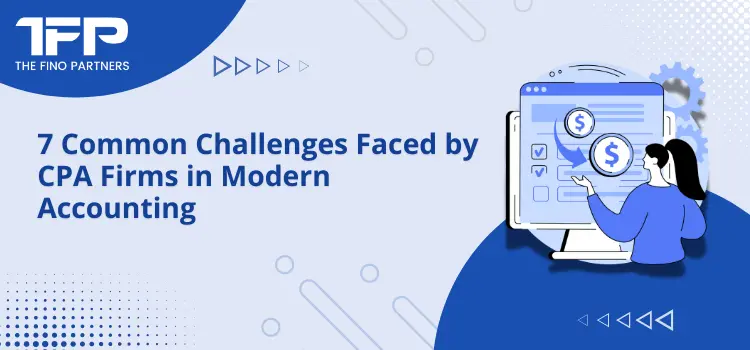The accounting business has been playing snake-and-ladders for a while. Businesses who use ‘Certified Public Accountants (CPA) now operate in troubled waters. CPA businesses undertake a major privation in the intricately almost-impossible financial world to stay compliant, stay profitable and provide top-notch customer service. The loops of trial are never ending ranging from fluctuating tax laws to the ever-changing tech. This article examines seven customary problems that CPA firms face in the current accounting landscape and provides recommendations on how to overcome them in order to preserve efficiency and satisfy clients.
Contending Technological Advancements
Challenge:
The accounting sector has seen an evolution due to the swift advancement of technology, posing advantages as well as hazards. CPA firms are required to be tech-savvy to have a shortcut to success. However, the shortcut does come with some heavy cost.
Resolution:
Firms should make sure their investments are fed to the most important tasks, like training the staff in the latest tech. Furthermore, cloud-based accounting solutions should be employed by CPA firms to enhance their safety system in place, scalability and ensuring flexibility. Working together with IT specialists additionally allows for the seamless integration of new technology into current systems.
The acquiescence of regulations and Changes
Challenge:
Making sure the business run by your client does not surpass any of the latest laws in action. Fluctuations in accounting standards, tax legislation and other regulations that have an impact on your clients must be updated routinely. Regulation changes on a regular basis can be daunting, especially for smaller businesses with tighter budgets.
Resolution:
CPA firms should create a specialized compliance staff or officer to handle this difficulty. This individual will make sure about all the current applicable laws and your firm adheres to all the necessary laws. Firms can also run the marathon of keeping up with the laws by joining professional associations, attending webinars, and subscribing to industry periodicals.
Talent Acquisition and Retention
Challenge:
For CPA businesses, recruiting and retaining competent accounting experts is a major issue. There's usually a shortage of qualified accountants in comparison to demand, which creates a highly competitive job market. As we are progressing many years, younger accountants are joining the workforce now and then while the seasoned professionals are in age to retire.
Resolution:
CPA firms should provide competitive pay, perks, and opportunities of growth to the budding accountants to eventually hire them. Advocating for a healthy work-life balance and fostering a positive work environment can make many young accountants join your firm. In addition, businesses can provide mentorship programs or internships to make the young accountants familiar with the world of accounting.
Setting clear boundaries with your clientelle
Challenge:
Nowadays, clients look for more than merely basic accounting services from their CPA firms. They are looking for personalized attention, real-time fiscal insights, and guidance services. It can be difficult for CPA firms to manage these expectations while staying profitable, especially when they are juggling many clients with various requirements.
Resolution:
By establishing clear channels of communication and keeping their word, businesses can control the expectations of their clients. Meeting client requests can be facilitated through offering value-added services like business consultancy and financial planning. Furthermore, utilizing technology to deliver real-time data and insights can improve customer satisfaction and foster enduring partnerships.
Data Security and Privacy
Resolution:
The upsurge of internet access and the readily available financial reports due to it has made CPA firms vulnerable to numerous cyber attacks. Businesses should make certain that their data-privacy requirements are compliant and safeguards confidential client data.
Resolution:
CPA firms should emphasise on employing strong cybersecurity measures, such as encryption, firewalls, and safe data storage choices.Routine security checks and introducing training programs for staff is a great way for firms to combat online risks Businesses should also put policies and procedures in place to deal with data breaches and guarantee adherence to privacy laws such as the California Consumer Privacy Act (CCPA) and the General Data Protection Regulation (GDPR).
The constraints of Pricing and Profitability
Resolution:
In order to draw and keep clients in the fiercely competitive accounting sector, CPA firms often find themselves under pressure to reduce their costs. As the inflation jumps sky-high, offering an affordable course of action might not be a viable option to ensure prifitability.
Resolution:
Value-based pricing, in which expenses are determined by the value provided to clients instead of the number of hours spent, is something that CPA firms ought to do. With this strategy, businesses may bill for their knowledge and the results they provide as opposed to just the time invested in tasks. Businesses can also increase profitability by optimizing their workflows, cutting onto inefficiencies, and using technology to automate repetitive jobs.
The play of Work-Life Balance
Challenge:
The rigorous demands of the accounting field, particularly throughout tax season, can cause burnout in staff members of CPA firms. Keeping a good work-life balance is a prevalent issue that has an impact on productivity and employee well-being.
Resolution:
CPA firms can overcome this obstacle by encouraging a work-life balance-oriented culture. Burnout can be avoided by providing programmable hours, remote work choices, and incentives for staff members to take time off. In addition, businesses must to keep an eye on staff workloads and redirect duties as necessary to ensure that nobody is overburdened.
Conclusion
CPA firms operate in a demanding and fluctuating environment. They suffer from several impediments like talent management, legislative changes, and technological improvements and need to implement effective solution-plans. CPA firms can tackle these difficulties by keeping pace with technological advances, assuring compliance with regulations, recruiting and retaining employees, maintaining client demands, preserving data, resolving pricing constraints, and fostering work-life balance. Businesses that maintain flexibility and retain their creative juices will see levelling up their game to the path of success. Accounting will change with time, and so should your business.
Read Also The Role of Technology in Modern Accounting Outsourcing



























